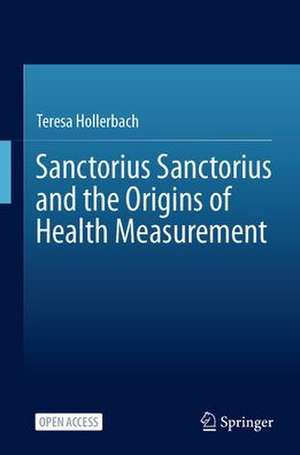Sanctorius Sanctorius and the Origins of Health Measurement
Autor Teresa Hollerbachen Limba Engleză Paperback – 19 mai 2023
| Toate formatele și edițiile | Preț | Express |
|---|---|---|
| Paperback (1) | 358.20 lei 6-8 săpt. | |
| Springer International Publishing – 19 mai 2023 | 358.20 lei 6-8 săpt. | |
| Hardback (1) | 431.94 lei 6-8 săpt. | |
| Springer International Publishing – 19 mai 2023 | 431.94 lei 6-8 săpt. |
Preț: 358.20 lei
Nou
Puncte Express: 537
Preț estimativ în valută:
68.55€ • 74.43$ • 57.58£
68.55€ • 74.43$ • 57.58£
Carte tipărită la comandă
Livrare economică 22 aprilie-06 mai
Preluare comenzi: 021 569.72.76
Specificații
ISBN-13: 9783031301209
ISBN-10: 303130120X
Pagini: 327
Ilustrații: XXII, 327 p. 1 illus.
Dimensiuni: 155 x 235 mm
Greutate: 0.49 kg
Ediția:1st ed. 2023
Editura: Springer International Publishing
Colecția Springer
Locul publicării:Cham, Switzerland
ISBN-10: 303130120X
Pagini: 327
Ilustrații: XXII, 327 p. 1 illus.
Dimensiuni: 155 x 235 mm
Greutate: 0.49 kg
Ediția:1st ed. 2023
Editura: Springer International Publishing
Colecția Springer
Locul publicării:Cham, Switzerland
Cuprins
Acknowledgements.- Preface (Dr. Matteo Valleriani).- Introduction.- List of Figures.- Abbreviations and Short Titles.- Chapter 1. Sanctorius Sanctorius—Between Koper and Venice.- Chapter 2. Sanctorius’s Galenism.- Chapter 3. Sanctorius’s Work in its Practical Context.- Chapter 4. Quantification in Galenic Medicine.- Chapter 5. Quantification and Certainty.- Chapter 6. The Measuring Instruments.- Chapter 7. Sanctorius Revisited.- List of Appendices.
Notă biografică
Teresa Hollerbach studied History of Science and History of Technology in Berlin and Florence. She completed her PhD at the Max Planck Institute for the History of Science and the Technical University of Berlin with a dissertation on the Venetian physician Sanctorius Sanctorius (1561–1636) and his role in the context of the process of the emergence and establishment of methods of quantification in medicine. Afterwards, she researched the role of the Max Planck Institute for Human Development in the pedophile debate in West Germany of the 1960s and 1970s. Processes of scientific knowledge production and transformation, the epistemology of practical knowledge, and material culture studies are her main research interests. Since 2022, she works in the field of science communication.
Textul de pe ultima copertă
This open access book offers new insights into the Venetian physician Sanctorius Sanctorius (1561–1636) and into the origins of quantification in medicine. At the turn of the seventeenth century, Sanctorius developed instruments to measure and quantify physiological change. As trivial as the quantitative assessment of health issues might seem to us today – in times of fitness trackers and smart watches – it was highly innovative at that time. With his instruments, Sanctorius introduced quantitative research into the field of physiology. Historical accounts of Sanctorius and his work tend to tell the story of a genius who, almost out of the blue, invented a new medical science, based on measurement and quantification, that profoundly influenced modernity. Abandoning the “genius narrative,” this book examines Sanctorius and his work in the broader perspective of processes of knowledge transformation in early modern medicine. It is the first systematic study to include the entire rangeof the physician’s intellectual and practical activities. Adopting a material culture perspective, the research draws on the contemporary reconstruction of Sanctorius’s most famous instrument: the Sanctorian weighing chair. And here it departs from past studies that focus mainly on Sanctorius’s thinking rather than on his making and doing. The book also re-evaluates Sanctorius’s role in the wider process of the early transformation of medical culture in the early modern period, a process that ultimately led to the abandonment of Galenic medicine and to the introduction of a new medical science, based on the use of quantification and measurement in medical research. The book is therefore an important contribution to the history of medicine and historical epistemology aimed at historians of science and philosophy.
Caracteristici
Considers the practical and material dimensions This book is Open Access, which means that you have free and unlimited access Adopts a perspective that integrates the histories of medicine Examines Sanctorius and his work in the broader perspective of processes of knowledge transformation
